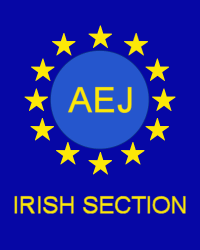By Deaglán de Bréadún
Visits to the European Union
institutions are never lacking in interest. There is always something going on
or under discussion that is going to affect our lives in one way or another.
But a recent trip by a group of Irish journalists has to rank among the most
interesting because it took place at a time when the issue of Brexit, Britain’s
impending departure from the EU, was finally coming to a head.
Along with a dozen Irish colleagues, including Richard Moore and Tim Ryan from the Association of European Journalists, I boarded the Aer Lingus flight to Brussels on the afternoon of Wednesday March 20th. Others in the group included John Downing and Wayne O’Connor from Independent News and Media; Damien O’Reilly, Cormac Ó hEadhra and Bríd Ní Chualáin from RTÉ and Raidió na Gaeltachta; Susan O’Keeffe of the Sunday Business Post; Gráinne Ní Aodha from theJournal.ie; Barry Cassidy of the Irish Farmers Journal; Claire McCormack from the website Agriland; and Stephanie Costello, who is a freelance, like myself.
The trip was the latest in a series
of briefing visits organised by the European Commission Representation in
Ireland in conjunction with the European Parliament Information Office.
Martin’s Hotel , where we stayed, is located close to various key institutions
of the EU. It is also a short walk from Kitty O’Shea’s, named after the
famous character in Irish political history, which is a popular meeting-place
for the Irish community in Brussels.
Some members of the group also
secured media accreditation for the European Council meeting where Theresa
May’s application for an extension of the date for British withdrawal from
March 29th until June 30th was considered.
After an eight-hour discussion, it was announced at a late-night press
conference that the leaders of the other 27 EU member-states would allow an
extension until May 22nd, provided the Withdrawal Agreement was
approved by the UK House of Commons in the coming week, or April 12th if
the Agreement failed to secure majority support from the MPs at Westminster.
High drama indeed and, by the time
you read this, there will doubtless be further developments in the saga.
Earlier, on Thursday morning in a room called Cabinet Hogan, we had a briefing
from the European Commissioner for Agriculture and former Irish Minister for
the Environment, Phil Hogan. He was sharply critical of Brexit, describing it
as “the most amateurish project ever”. As inquisitive journalists, we pressed
him on the issue of a second term in the office of Commissioner, since his
current five-year stint expires at the end of this year. He was diplomatic in
his response, saying that if asked to serve again he would do so, because it is
“a very interesting portfolio”.
Mairéad McGuinness, First
Vice-President of the European Parliament, also spoke to us on the Brexit issue
and the level of “fatigue and frustration” it was creating. She described the
Backstop as “absolutely essential” to prevent the return of a hard border
between the two parts of the island of Ireland. But she expressed serious
concern over the political stalemate at Stormont: “The fact that there is no
Assembly is just a disaster for Northern Ireland.” The Fine Gael MEP has
contributed to the current debate in the British media but she was critical of
the low level of TV coverage given to British MEPs who are opposed to Brexit,
whereas Brexiteer Nigel Farage was, she said, in effect using the European
Parliament “as a YouTube studio”.
The colourful Luke ‘Ming’ Flanagan
MEP spoke to us at length and in impassioned tones about the EU Common
Agricultural Policy and the importance, as he sees it, of “convergence”, to
ensure greater equality in the distribution of income subsidies so that small
family farms get better treatment. But his most memorable comment was on
Brexit, where he struck a hopeful note that a deal would be successfully
implemented because “the Brexiteers are slowly but surely waking up to the fact
that they now have a choice of three-quarters or a choc-ice or no choc-ice”.
We also had briefings from Polish MEP
and former European Commissioner, Danuta Huebner; European Commission deputy
chief spokesperson Alexander Winterstein; and Manuel Mateo Goyet, who works
with Commissioner for Digital Economy and Society, Mariya Gabriel.
Although we had no formal engagement
with Brian Hayes MEP, who is leaving politics for the private sector, some of
us had a most interesting and illuminating social evening in his company.
All in all, it was a very useful and
well-timed visit. The balance of mainstream and agricultural journalists in the
group as well as the different levels of professional experience also made for
a successful trip.
